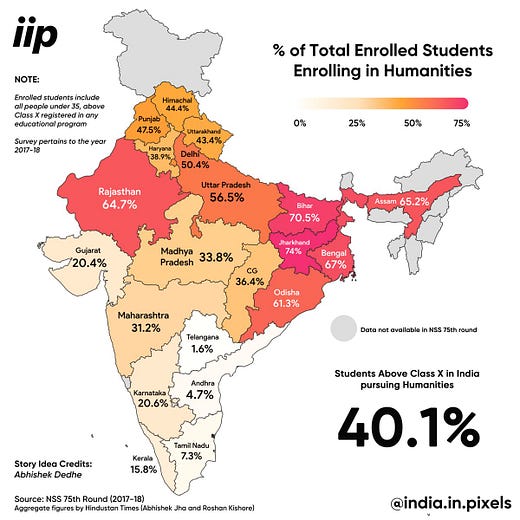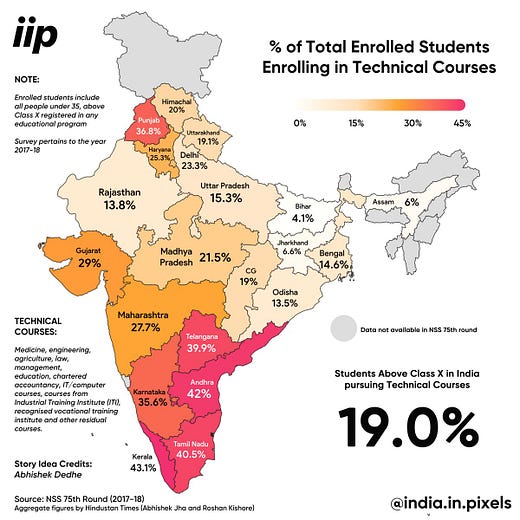Jaspreet Oberoi: Punjab Versus The Indian National Media
2022 has seen a surge in hollow opinion pieces published within national print media, that are brazenly hostile towards the state of Punjab and its people
Jaspreet Oberoi
February 10, 2022 | 7 min. read | Opinion
Punjab and Punjabis have been making headlines in the Indian national media for some time now. The year 2021 ended with a win for the Punjab-led farmer organizations over the Modi government and 2022 has been all about the upcoming Punjab elections, which have surprisingly over-shadowed the otherwise much-touted UP elections.
Not to miss, January 2022 was filled with ‘Punjab vs Modi’ rhetoric because the PM’s cavalcade was forced to spend 20 minutes on a fly-over in Punjab due to a roadblock by protestors. According to PM Modi, there was a threat to his life and he barely escaped death that day, a claim widely mocked by many.
While it is not new for Punjabis, and especially Sikhs to be tarnished and attacked by national TV news channels, and face targeted harassment on social media, 2022 has seen an unusual surge in hollow opinion pieces published within national print media, that are brazenly hostile towards the state of Punjab and its citizens.
The first one of this year was penned by Rajeev Srinivasan for Firstpost. The author has attacked the Sikh community overtly in this piece without even trying to be subtle. He starts by mentioning how he used to be naive earlier and thought about Sikhs as men of honor and principle. He talks about the so-called Khalistani infiltration in the Farmers’ Protest and the recent responses to cases of beadbi, from which he ends up inferring that the Sikh population of Punjab has been severely indoctrinated.
Contrastingly, opposite to his ill-informed opinion, the data (state-wide) on communal violence in India suggests that Punjab is one of the most peaceful states in India by a large margin. This is all the more considerable considering rising communal tension and violence under Modi’s Hindutva government in many parts of India.
Rajeev goes on to then say that Sikhs benefited unfairly from the green revolution and are now exploiting the national government by eating into the taxpayers' money through MSP. He ends his diatribe by mocking those Sikhs who were recently forced to flee Afghanistan with the raise of the Taliban and ISIS.
Rajeev is an old-timer with Firstpost and has a history of writing pro-Modi, anti-opposition, anti-Dalit and anti-Muslim pieces in the past. The fact that this is his first-ever piece on Punjab and Sikhs, in his 11 years of writing for Firstpost, and he chose to take them down so shamelessly, indicates questionable motives.
Two weeks after the one discussed above, appeared another scathing piece against Punjab. This was written by Mohan Guruswamy for Deccan Chronicle.
He starts by calling Punjab a ‘basket-case’. The term originated in America after the First World War, describing a soldier missing both his arms and legs who needed to be carried around in a ‘basket’. It indicates a state of helplessness, liability, and burden. This fabricated and imaginary condition of Punjab is what the author desperately tries to justify in this piece.
He labels Punjab a ‘national burden’, describing Punjab as a state being kept afloat by the rest of India, and declares that India has been extremely ‘generous’ towards Punjab.
The partition of India, which affected Punjab the most, leaving hundreds of thousands of Punjabis dead and millions of them missing, has been labeled as a welcomed event by Mohan. He considers it a gift to the Sikhs who then made hay with the land they received in lieu of losing their original holdings in Pakistan.
The fact that Punjab was solely responsible for feeding the whole of India in the past, sacrificing its water table, ecosystem and cancer-free environment is at best glossed over by Mohan. Instead, he goes on to add that India is doing a favor to Punjab by recruiting Sikhs in the armed forces. He laments the fact that Sikhs end up receiving pensions for serving on the borders and risking their lives.
He conveniently ignores that Sikh Regiment is the most decorated regiment in India and one of the top ones amongst the entire Commonwealth. The amount of gallantry awards that soldiers of this regiment have received for bravery and laying down their lives is unmatched.
Mohan ends his piece with an extremely cheap and petty argument against the youth of Punjab. He calls them lazy and disinterested in studying or competing with the rest.
There is no reason to believe his preposterous claim because Punjab ranks towards the top in India on the literacy rate.
To add, he writes that India’s economy is growing and everybody except the Punjabis is participating, contributing, and benefiting from it.
It is worth noting here that the unemployment rate in Punjab is 9% compared to Haryana’s 23.4% and Delhi’s 14.1%, and that Punjab has some of the lowest rates of poverty in the country.
Mohan concludes by baselessly writing that Punjabis are more interested in ‘low-level’ service jobs and to run illegal businesses in the west.
It is interesting that Mohan wrote a similar piece against Punjab and Punjabis in 2016, so much so that he has actually plagiarized and copy-pasted many of his own six-year-old thoughts from the 2016 piece into the one written in January 2022.
The next I want to talk about is the habitual offender, Shekhar Gupta. He released a piece this week, which reeks of mockery, ignorance, and hatred towards Punjabis, and Sikhs in particular. Using the title itself, Shekhar pins the blame of Punjab’s condition on the citizenry of Punjab by calling them, ‘self-congratulatory’ idiots, leaning into many stereotypes along the way. His use of the term ‘Balle-Balle’, ridicules the supposed happy-go nature of Punjabis, looks down upon their jolliness, and insinuates carelessness.
With much liberty, he labels Sikhs in this piece as egoistic, lazy, and racist towards the people of other states. He calls the Farmers’ Protest a spectacle that Sikhs could afford to put up because they had migrants from Bihar and UP working for them in the fields. This is exactly the lie that BJP has been parroting from the beginning about the protests being a handiwork of ‘few’ rich Sikh farmers, all the while ignoring the unity between farmers and labourers that made the movement a success.
He then goes on to mock the Sikh men who are unable to migrate to foreign lands after their contracted spouses abandon them. A social issue that is of much seriousness and concern for the community, and responsible for multiple deaths, is sadly a matter of joke to Mr. Gupta. He literally prescribes the ‘abandonment of Sikh husbands’ to be added to the stereotypes of lassi, makki-ki-roti and saag, leg, peg, tittar (partridge), kukkad (chicken).
As his piece gets more and more cringeworthy and demeaning he stops mincing words around the end. He calls Punjabis hopeless, addicts, and people of low self-esteem. He concludes by baffingly insinuating that the majority of emigrating Sikhs do so illegally and they are living worse lives than the daily wage earners in India.
This is contradictory to a piece published by his own outlet back in 2019. In that article, it is well explained how Sikhs are one of the most affluent, powerful, and successful immigrant communities in Canada.
This is not the first time Mr. Gupta has written a denigrating piece against Punjab. He has in fact used the term ‘Balle-Balle’ multiple times in the past to belittle and ridicule Sikhs of Punjab. He used it when he wrote about the farmers’ protest in 2020. He used it in 2017 when he blamed Khalistani Sikhs for AAP’s loss. He used it in 2015 when he equated Sikh demands of autonomy and federalism with ISI’s anti-India terrorist activities; and he used ‘Balle-Balle’ thrice in his 2014 piece on Punjab, which as expected, was filled with disparaging commentary about Punjabis and Sikhs.
On the same day as Gupta’s piece, a ground report dropped from The Morning Context which tried to paint Punjab as a sort of lawless ‘gun capital’ of India. Though there is certain truths in what the piece mentions at parts, from the deaths caused due to celebratory fires to the ‘Punjabi pop’ promoting guns via enticing lyrics, there are multiple points in the writing where lazy stereotyping and faulty causations take over.
While talking about the total number of licensed guns in Punjab and comparing it with the other states, the author misses an extremely crucial point that most of these licenses were acquired in the period between 1980-90s when the Indian state pushed Punjab into the dark days of the Sikh Genocide. Citizenry did not feel safe and could not trust the police for their safety and well-being. This omission seems intentional because she does mention in the piece that the high number of licenses in J&K is due in part to the security instability there.
It is obvious that Punjab was brought into the gun debate because of the impending elections and the potential TRP gain, it is still strange that UP, the other state going to elections, wasn’t even mentioned once in the piece. UP accounts for more than half of cases pertaining to illegal possession of arms and 40% of deaths from gun violence in India.
There is no doubt that just like other states of India, Punjab faces an uphill task of becoming a model state which can support the ambitions and aspirations of its population. What is unfortunate though is that instead of proposing solutions and empathizing with the citizenry of the state, influencers at the national scene seem to be working extremely hard doing the opposite - essentially providing half baked theories that are easily deconstructed with even a rudimentary level of nuance
We are yet to see a single piece in a national edition of print media about the exploitation of Punjab at the hands of the Indian state. Maybe we will never.
Jaspreet Oberoi was born and raised in Patiala, Punjab, and currently lives in Vancouver, Canada. He is a columnist focused on socio-political issues concerning India and Canada. You can find him on Twitter at @ijasoberoi.
Baaz is home to opinions, ideas, and original reporting for the Sikh and Punjabi diaspora. Support us by subscribing. Find us on Twitter, Instagram, and Facebook at @BaazNewsOrg. If you would like to submit a written piece for consideration please email us at editor@baaznews.org.










